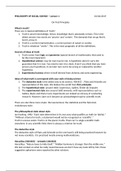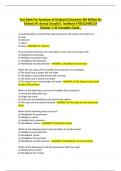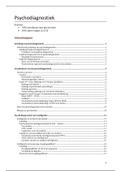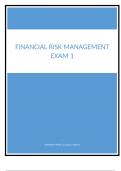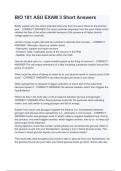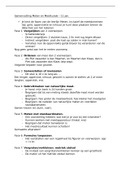Non-Fraudulent Property Offences
Lecture 17
3 main offences:
1. Theft
2. Robbery
3. Burglary
Legislation: Theft Act 1968:
“expressed in simple language, as used and understood by ordinary literate men and
women. It avoids as far as possible those terms of art which have acquired a special
meaning understood by lawyers in which may of the penal enactments were couched”
(Lord Diplock in Treacy v DPP [1971] 1 ALL ER 110)
o The theft act was drafted in the way it was in order to make it more accessible.
The act was to make the law of theft more modern.
Clear statutory language?
“dishonestly”
“force”
o Force is used in the context of robbery
“building” etc
o The essence of burglary is theft from a building.
“Even such ordinary words in the Theft Act…may involve definitional problems on
which a jury require guidance if like is to be treated as like”
(D Ormerod, Smith and Hogan Criminal Law, 13th edn 2011, p.779)
The difference between robbery and theft in terms of sentencing is very significant!
Theft
s 1(1) of the Theft Act 1968:
“A person is guilty of theft if he dishonestly appropriates property belonging to another
with the intention of permanently depriving the other of it; and ‘thief’ and ‘steal’ shall be
construed accordingly”.
This one basic definition is that can be applied to the whole range of stealing from one-
off and opportunistic shoplifting through pocket-picking, small-scale work-place theft to
systematic, “professional” or organised thefts of large values of goods or money.
Theft: Actus Reus -
The actus reus of theft consists (a) in the appropriation of (b) property (c) belonging to another.
In a lot of theft cases, whether it’s someone’s ‘property’ is not typically the issue. The
issue normally surrounds the dishonestly element.
Appropriation:
By s 3 of the Theft Act 1968:
1. Any assumption by a person of the rights of an owner amounts to an appropriation, and
this includes, where he has come by the property (innocently or not) without stealing it,
any later assumption of a right to it by keeping or dealing with it as owner.
2. Where property, or a right or interest in property is or purports to be transferred for
value to a person acting in good faith, no later assumption by him of rights which he
, believed himself to be acquiring shall, by reason of any defect in the transferor’s title,
amount to theft of the property. (= bona fide purchaser exception)
a. If you bought something on good faith you won’t be guilty; the prosecution
probably wouldn’t be able to show you had the mens rea
Appropriation= widely interpreted definition:
“Any right” (any right suggests there are lots of different rights):
3. Put simply this means acting in relation to the property as if you are the owner of
said property and indeed R v Morris [1983] 3 WLR 697 confirmed that an
appropriation was not just physically taking the property, but could be achieved for
example by doing any act that only the owner has the right to do, for example by selling
it.
R v Morris [1984]: Switching price labels: assumption of any rights
FACTS: The defendant switched the price labels in supermarkets so that when they
reached the checkout they were unknowingly charged a lower price than intended by the
shop assistant.
The defendant was charged with theft but protested the charge claiming no appropriation
took place.
ISSUE: was whether changing the label amounts to appropriation
HELD: The House of Lords held that an appropriation did not require the assumption of
all of the rights of the owner, merely an adverse interference with the rights which the
defendant had done when switching the labels, an act which reserved by the owner for
their exclusive doing (basically, they just had to interfere with ONE of the rights
which in this case is switching the label which is the right of the owner to do). An
appropriation will still occur where the defendant has the property with the owner’s
permission but then exceeds this permission by assuming the rights of the owner, for
example they have been lent a DVD and have it in their possession with the permission of
the owner but then exceed the permission by deciding not to give it back or by putting it
on eBay!
R v Gomez [1993]: Accepts Morris on this point; confirms that an appropriation can occur even
when the owner of the property gives consent. This extends even to situations where the owner
gifts the property to the defendant, as was confirmed in R v Hinks [2000] UKHL 53.
“Owner’s consent irrelevant”:
R v Lawrence [1972]: Italian student & taxi driver: consent irrelevant; Morris had said the
contrary: ‘adverse appropriation’
FACTS: An Italian man who spoke little English, arrived at Victoria Station on his first
visit to this country. He got a taxi and gave the driver a piece of paper on which an
address was written. The taxi driver told him it was a long way and would be expensive.
On arrival at the destination the Italian, took one pound out of his wallet and gave it to
the driver. The driver intimated that it was not enough and reached into his open wallet,
Lecture 17
3 main offences:
1. Theft
2. Robbery
3. Burglary
Legislation: Theft Act 1968:
“expressed in simple language, as used and understood by ordinary literate men and
women. It avoids as far as possible those terms of art which have acquired a special
meaning understood by lawyers in which may of the penal enactments were couched”
(Lord Diplock in Treacy v DPP [1971] 1 ALL ER 110)
o The theft act was drafted in the way it was in order to make it more accessible.
The act was to make the law of theft more modern.
Clear statutory language?
“dishonestly”
“force”
o Force is used in the context of robbery
“building” etc
o The essence of burglary is theft from a building.
“Even such ordinary words in the Theft Act…may involve definitional problems on
which a jury require guidance if like is to be treated as like”
(D Ormerod, Smith and Hogan Criminal Law, 13th edn 2011, p.779)
The difference between robbery and theft in terms of sentencing is very significant!
Theft
s 1(1) of the Theft Act 1968:
“A person is guilty of theft if he dishonestly appropriates property belonging to another
with the intention of permanently depriving the other of it; and ‘thief’ and ‘steal’ shall be
construed accordingly”.
This one basic definition is that can be applied to the whole range of stealing from one-
off and opportunistic shoplifting through pocket-picking, small-scale work-place theft to
systematic, “professional” or organised thefts of large values of goods or money.
Theft: Actus Reus -
The actus reus of theft consists (a) in the appropriation of (b) property (c) belonging to another.
In a lot of theft cases, whether it’s someone’s ‘property’ is not typically the issue. The
issue normally surrounds the dishonestly element.
Appropriation:
By s 3 of the Theft Act 1968:
1. Any assumption by a person of the rights of an owner amounts to an appropriation, and
this includes, where he has come by the property (innocently or not) without stealing it,
any later assumption of a right to it by keeping or dealing with it as owner.
2. Where property, or a right or interest in property is or purports to be transferred for
value to a person acting in good faith, no later assumption by him of rights which he
, believed himself to be acquiring shall, by reason of any defect in the transferor’s title,
amount to theft of the property. (= bona fide purchaser exception)
a. If you bought something on good faith you won’t be guilty; the prosecution
probably wouldn’t be able to show you had the mens rea
Appropriation= widely interpreted definition:
“Any right” (any right suggests there are lots of different rights):
3. Put simply this means acting in relation to the property as if you are the owner of
said property and indeed R v Morris [1983] 3 WLR 697 confirmed that an
appropriation was not just physically taking the property, but could be achieved for
example by doing any act that only the owner has the right to do, for example by selling
it.
R v Morris [1984]: Switching price labels: assumption of any rights
FACTS: The defendant switched the price labels in supermarkets so that when they
reached the checkout they were unknowingly charged a lower price than intended by the
shop assistant.
The defendant was charged with theft but protested the charge claiming no appropriation
took place.
ISSUE: was whether changing the label amounts to appropriation
HELD: The House of Lords held that an appropriation did not require the assumption of
all of the rights of the owner, merely an adverse interference with the rights which the
defendant had done when switching the labels, an act which reserved by the owner for
their exclusive doing (basically, they just had to interfere with ONE of the rights
which in this case is switching the label which is the right of the owner to do). An
appropriation will still occur where the defendant has the property with the owner’s
permission but then exceeds this permission by assuming the rights of the owner, for
example they have been lent a DVD and have it in their possession with the permission of
the owner but then exceed the permission by deciding not to give it back or by putting it
on eBay!
R v Gomez [1993]: Accepts Morris on this point; confirms that an appropriation can occur even
when the owner of the property gives consent. This extends even to situations where the owner
gifts the property to the defendant, as was confirmed in R v Hinks [2000] UKHL 53.
“Owner’s consent irrelevant”:
R v Lawrence [1972]: Italian student & taxi driver: consent irrelevant; Morris had said the
contrary: ‘adverse appropriation’
FACTS: An Italian man who spoke little English, arrived at Victoria Station on his first
visit to this country. He got a taxi and gave the driver a piece of paper on which an
address was written. The taxi driver told him it was a long way and would be expensive.
On arrival at the destination the Italian, took one pound out of his wallet and gave it to
the driver. The driver intimated that it was not enough and reached into his open wallet,

